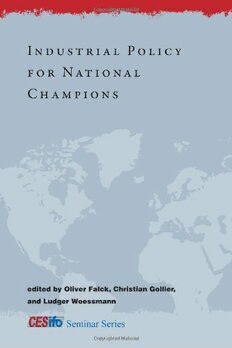
Industrial Policy for National Champions PDF
219 Pages·2011·0.624 MB·English
Most books are stored in the elastic cloud where traffic is expensive. For this reason, we have a limit on daily download.
Preview Industrial Policy for National Champions
Description:
Governments around the world are deeply divided about the proper role of industrial policy, with some politicians arguing for hands-off governance and others supporting government intervention to promote "national champions"-- firms that receive government support for both political and economic reasons. In this volume, prominent economists present the pros and cons of government support for national champions. The contributors use the rigor of economic models in their studies, offering a quantitative perspective that complements and extends existing qualitative studies, and focus on issues emerging from the European Union's substantial degree of market integration. Many arguments in favor of champions-promoting policies are made in a dynamic context, so the book first presents chapters that take a dynamic economy view, then presents chapters that examine the political economy of the decision process, and finally, offers "classical" static equilibrium arguments. The richness of the different models provides a deeper understanding of industrial policy than could any model alone. What becomes clear from these different perspectives nevertheless is that it is difficult to make a general case in favor of policies promoting national champions on purely economic grounds and that these policies are best understood in political terms.
See more
The list of books you might like
Most books are stored in the elastic cloud where traffic is expensive. For this reason, we have a limit on daily download.
